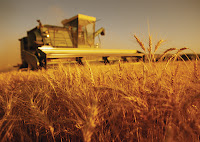 |
| ASK Official Logo |
But strictly speaking have ASK Shows lost their essence and become more about showmanship than agricultural and business learning places?
Information from the ASK website,(which I must say was a complete suprise to see that they even have an up-to-date website) shows that these exhibitions started in Kenya back in 1901, about 111 years ago. Kenya then being under what was to become a British colony, had seen farmers from parts of England, Scotland, Ireland and others as far as Australia eventually settling in the country. It started out as the East African Agricultural and Horticultural Society (EAA& HS). It's objective was to 'promote agricultural development based on European settlement'.
It was renamed the Royal Agricultural Society of Kenya in 1949 at the height of colonial rule in Kenya. In 1964 it dropped the 'Royal' to remain Agricultural Society of Kenya as it is to date. Since the initial stages, it has enjoyed patronage from Government officials. It's current patron is the Head of State with the Agriculture Minister ( along with the unnecessary Minister of Livestock Development & Fisheries) serving as Deputy Patrons.
Currently there are 3 categories;
- International Fairs - including Nairobi International Trade Fair and Mombasa International Show;
- National Shows - which have Kitale, Eldoret, Nyeri, Meru, Nakuru and Kisumu Shows;
- Regional Shows - with Embu, Kakamega, Kisii, Kabarnet, Machakos, Garissa and Nanyuki Shows
 |
| ASK Logo - courtesy of www.ask.co.ke |
Secondly this exhibitionist nature is just for show quite literally. It would be more practical if they managed to have successful farmers showing us how and what they did to improve yields on their farms and how they might have tackled issues such as pests, diseases or low soil fertility. That way it would be make more sense to some of us. Those demo farms that are usually there serve for the purpose of showing ideal situations but very few farmers have such situations in their farms - if you get what I mean.
Well they do try to showcase the animals which come to be paraded and eventually sold out in some auction either to face the butcher's knife or become a prized piece for some farmer's cattle. This is one of the few reasons that it still makes sense to those of us keeping animals for commercial reasons. But besides the grade breed cows - the Friesians, Jerseys and others of this world- it would also be good to showcase mixed breeds too.
And while there are many young schooling students and farmers who show up to the grounds, I can assure you 75% of them have never held a hoe or panga save for the time they have to attend to some punishment meted out in school. Right from the days they step in school, they are made to understand their mission in school is to pass and move on to blue-collar jobs - doctors, lawyers and engineers - no dirtying of hands there!
Such shows should have tertiary institutions come with the best-of-practice and innovations they have been working on to make sure that they attract attention not just from budding farmers but also from investors who may fund their ideas from lofty dreams to practical work.
The Show should also ensure some of the outreach services that are usually show-cased at the grounds cane be extended beyond the 3-5days that people visit the venues. This should be to see that those who may have burning queries continue to be served by the agriculture and livestock officers - services such as A.I, veterinary, etc.
And it ought to be that exhibitors show innovative ways of working on the farms and getting better output from their animals. This thing of regurgitating the same exhibits and ways of doing business is just boring. When you see the same thing in one Show to the next, it not only becomes monotonous but annoying.
Out of curiosity by the way, do they still have membership for young and other members? I remember back in the day when one of my parents bought us the Junior members cards. This meant with that card I could gain entry to any Agricultural Show without having to pay any gate charges. Wonder how many junior members they have these days....
That I can't renew such membership on an annual basis, the way I do for such services as A.A (Automobile Association of Kenya) membership. And the challenge for ASK going forward is to entice the younger generation to take up farming and offer alternatives to the careers. Farming is no longer a part-time job as many would be wont to believe.
For all you Kisumu young farmers go forth this weekend and make them understand this...
{Thanks to the people working on the ASK website, the info was helpful though I wish you had more details on the National & Regional Shows -unique features of each}

